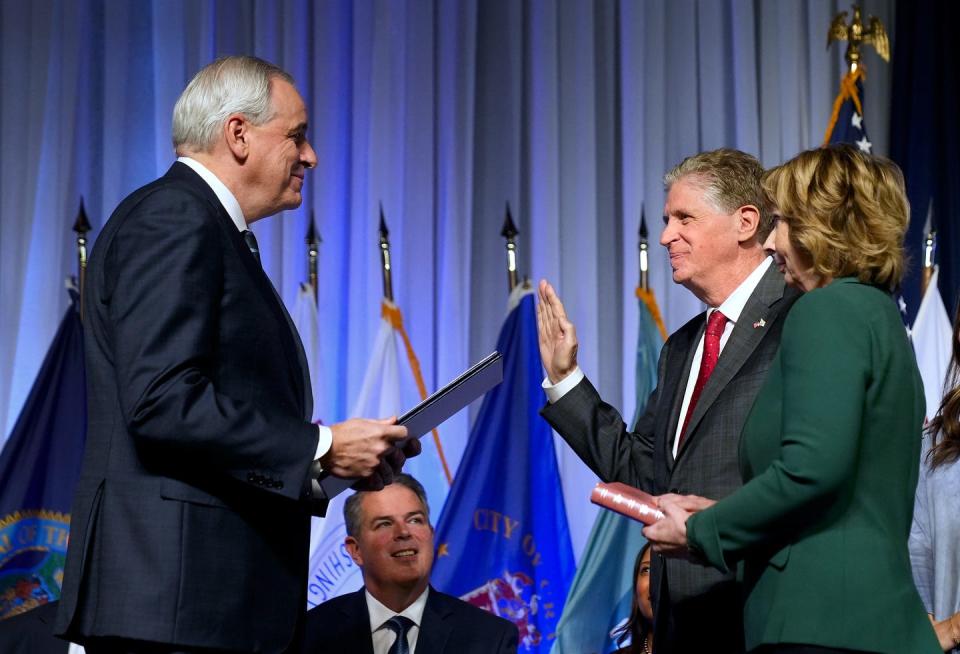PROVIDENCE – The latest face-off between Attorney General Peter Neronha and Gov. Dan McKee is playing out over a seemingly stunning fact: Rhode Island does not have a law that specifically bans bid-rigging.
Neronha made his case in a letter to legislators dated April 24 that said Rhode Island currently has “no mechanism to ensure accountability when double-dealing officials and vendors unduly influence bidding processes or interfere with contract submissions.”
“There is no sound basis for standing in opposition to this legislation,” Neronha argued. “Rhode Island taxpayers deserve the same protections as residents of other states.”
But McKee’s director of administration, Jonathan Womer, did indeed oppose the legislation – which was introduced by the House Oversight Committee chairwoman – that Neronha’s office says it drafted at the request of House and Senate leaders.
Womer’s argument? The bill goes too far.
“The department appreciates the intent of this legislation, but has concerns about disproportionate penalties, vague and overbroad language, unnecessary overlapping authority, and the unintended consequences … [these issues] would have on the state’s procurement process.”

Gov. Dan McKee, right, is sworn in for a full term as Rhode Island’s governor by Attorney General Peter Neronha at the Rhode Island Convention Center on Jan. 3, 2023.
McKee and Neronha have been at odds over bid-rigging
The bill is the latest move in a political war between McKee and the term-limited Neronha, whose ambitions beyond 2026 are not yet clear.
Neronha’s push to close “the gap” in state bidding law is an outgrowth of his investigation into the administration’s award, soon after McKee took office, of a $5.2 million mid-pandemic, school reopening contract to the ILO Group, a newly formed company with ties to one of the governor’s long-time allies from his days as Cumberland mayor.
As if it wasn’t complicated enough, the 18-month investigation by the Rhode Island State Police turned up evidence of a previously undisclosed deal in which the principals in Chiefs for Change – Michael Magee and ILO’s Julia Rafal-Baer – agreed to pay another company, SKDK, $15,000 a month off-the-books to provide McKee with advice.
At the end of the investigation, Neronha labeled the ILO contract award a “ham-handed” attempt by McKee to steer the contract away from a lower bidder to a favored company, but said there was insufficient evidence McKee did anything criminal.
McKee called the outcome proof he did nothing wrong. Neronha cited the absence in Rhode Island of a big-rigging law.
What happened next? Sponsors of the bill to close that gap withdrew their names from the bill, the day it was introduced after a top McKee aide, Rico Vota, reached out to them.
What would the bill do?
Most basically, the legislation defines bid rigging as a concerted activity by two or more persons to predetermine the winning bidder of a public contract.
As Neronha explains it: “It then goes on to prohibit conspiring, attempting, or rigging the state bidding process for any contract … [and it] prohibits public officials from improperly conveying any confidential bid-related information to unauthorized persons and/or from intentionally taking any action to corruptly influence the awarding of a contract to a particular bidder.”
The maximum penalty would be up to three years in prison and a fine of up to $1 million or three times the value of the submitted bid.
The citizens’ advocacy group Common Cause Rhode Island applauded the effort to make it “illegal for potential vendors to try and rig a public bidding process, or for public employees or officials to share confidential information with someone … [who might] benefit from the information in a bidding process.”
Why is the McKee administration objecting to the bill?
In his own letter to the lawmakers, Womer said: “Collusion in procurement is already prohibited under existing law, and this legislation is duplicative and vague and may have unintended consequences that would significantly chill the state’s procurement process.”
For example, he said Rhode Island already has a law which “prohibits collusive bidding” and a regulation that requires “professional behavior.”
Among his arguments against the proposed new law:
“The penalties contained in this legislation are more extreme than other states.” For example, he said, an analogous Pennsylvania law “provides a fine of up to $1,000,000 for entities and up to $50,000 for individuals.” The proposed Rhode Island law calls for “a fine of $1,000,000 or three times the amount of a submitted bid, whichever is greater – regardless of whether an entity or an individual is involved.”
“Vague language: The bill’s definition of ‘bid rigging’ … fails to define with sufficient particularity the prohibited conduct.” For example: it is unclear, he said, how terms such as “deliberate influence” would apply to routine interactions between agencies, making recommendations to the state purchasing agent. “The legislation also lacks any requirement of “quid pro quo’ or mens rea, meaning that public employees will be exposed to significant penalties merely for expressing their vendor preference.”
“Chilling effect: Government procurement is already a highly competitive and often contentious process, marked by frequent disputes and challenges from unsuccessful bidders. Expanding criminal liability to this extent, through a bill that includes numerous instances of vague and overly broad language, will likely chill the procurement process.”
“Duplicative & overlapping authority: The current “procurement structure permits the Department [of Administration] to handle bid protests and disputes, seek disciplinary action (including dismissal) against state employees who disregard purchasing requirements, and subject violating bidders to sanctions.” The legislation “vests broad independent and overlapping authority in the Attorney General.”
Other concerns?
The ACLU of Rhode Island took no position on the thrust of the bill, but raised concerns about some potentially “dangerous and inappropriate” language that could, for example, send a purchasing agent to prison for up to a year for buying food products from a Massachusetts or Connecticut farm instead of a Rhode Island farm.
This article originally appeared on The Providence Journal: Gov. McKee, Attorney General Neronha at odds over proposed bid-rigging law
